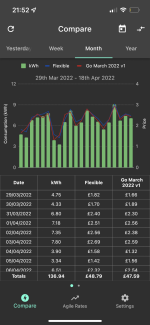Shanecb
Established Member
Hi all,
I started mentioning this on another thread which is now closed, but I was hoping those in the know would be able to help?
I'm trying to understand if it really is worth changing to Octopus Go from my existing tariff...
Currently with Eon on the following rate (now that my fixed rate has just ended):

Octopus rate would be:

I'm thinking the overnight rate would be great @ 13p cheaper. So say usable battery capacity of 60kwh on the LR...A full charge would be something like £4.50 on the OG tariff and £12.30 on eon (saving £7.80 per charge).
I will probably only charge about 3.5 times a month (all shared out at the cheaper rate) so an overall saving of £27.30 per month by moving to OG.
My question is with the day rate being 15p more expensive per kWh, would I just use up my savings with being charged more in the day?
I know it's all dependent on how much I use in the day, but I think I use about 400 kWh per month. Am I therefore right in thinking that my daytime use of 400kwh per month would therefore be about £60 pm more expensive so would actually be £32.70 more expensive for me to move to Octopus.
Sorry, quite detailed, but hoping someone could check my logic here...
I started mentioning this on another thread which is now closed, but I was hoping those in the know would be able to help?
I'm trying to understand if it really is worth changing to Octopus Go from my existing tariff...
Currently with Eon on the following rate (now that my fixed rate has just ended):
Octopus rate would be:
I'm thinking the overnight rate would be great @ 13p cheaper. So say usable battery capacity of 60kwh on the LR...A full charge would be something like £4.50 on the OG tariff and £12.30 on eon (saving £7.80 per charge).
I will probably only charge about 3.5 times a month (all shared out at the cheaper rate) so an overall saving of £27.30 per month by moving to OG.
My question is with the day rate being 15p more expensive per kWh, would I just use up my savings with being charged more in the day?
I know it's all dependent on how much I use in the day, but I think I use about 400 kWh per month. Am I therefore right in thinking that my daytime use of 400kwh per month would therefore be about £60 pm more expensive so would actually be £32.70 more expensive for me to move to Octopus.
Sorry, quite detailed, but hoping someone could check my logic here...


